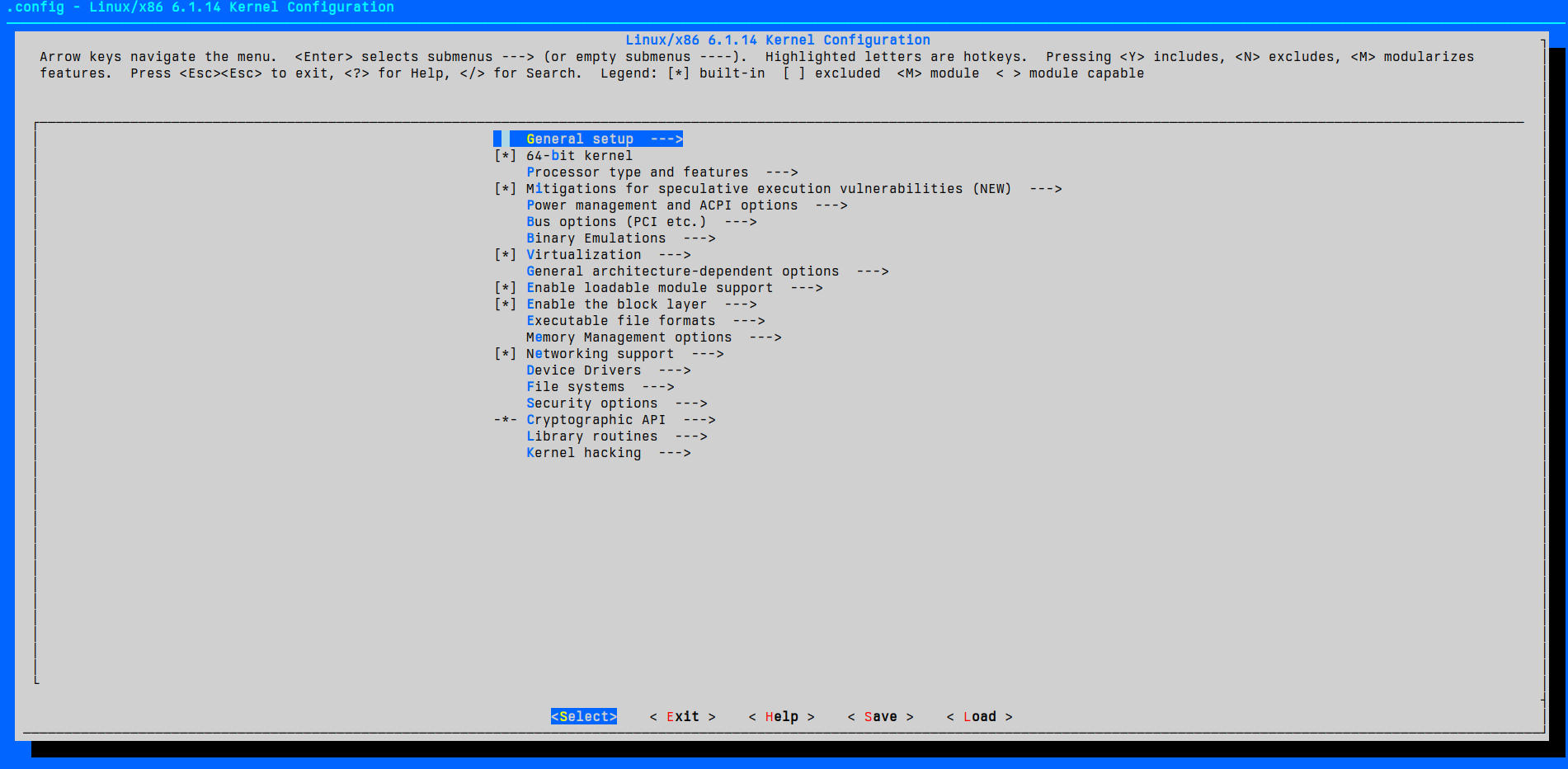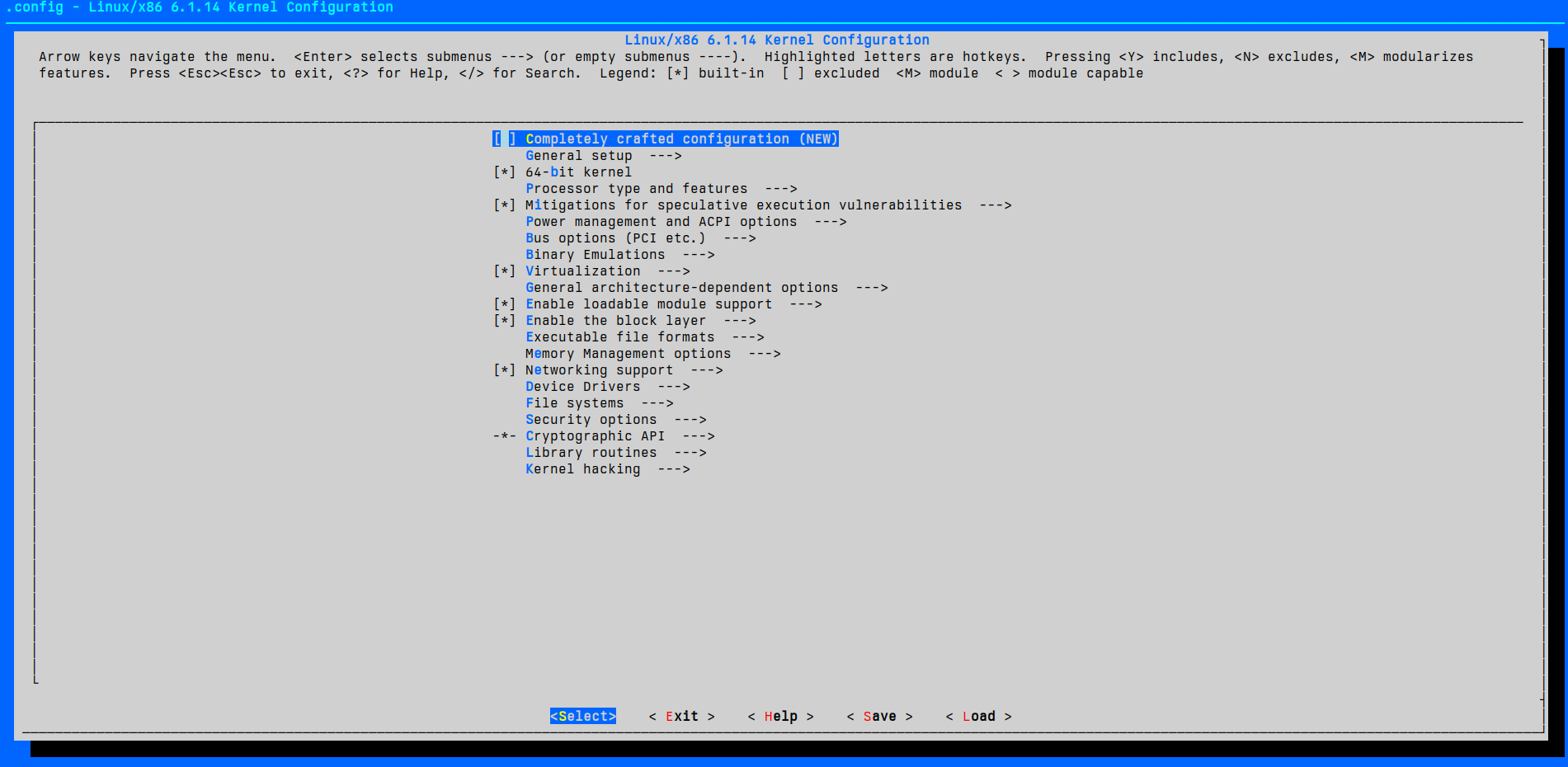Kconfig
Kconfig (Kernel Config) is the system that configures the kernel options (which is a very important part on the build system). You can find the Kconfig file in the root directory and see it’s recursive approach:
# SPDX-License-Identifier: GPL-2.0 # # For a description of the syntax of this configuration file, # see Documentation/kbuild/kconfig-language.rst. # mainmenu "Linux/$(ARCH) $(KERNELVERSION) Kernel Configuration" source "scripts/Kconfig.include" source "init/Kconfig" source "kernel/Kconfig.freezer" [...]
By looking at for example the init/Kconfig file we see how Kconfig is used to define some “”macros“” based on system checks (for example the compiler):
[...] config CC_IS_GCC def_bool $(success,test "$(cc-name)" = GCC) config GCC_VERSION int default $(cc-version) if CC_IS_GCC default 0 config CC_IS_CLANG def_bool $(success,test "$(cc-name)" = Clang) [...]
Or to define user-entered configurations:
config SECURITY bool "Enable different security models" depends on SYSFS depends on MULTIUSER help This allows you to choose different security modules to be configured into your kernel. If this option is not selected, the default Linux security model will be used. If you are unsure how to answer this question, answer N.
We can see how the option is a plain boolean and depends on other configurations.
Then, by using cscope we can see how the macro is used during the code:
Text string: CONFIG_SECURITY File Line 0 commoncap.c 1449 #ifdef CONFIG_SECURITY 1 commoncap.c 1485 #endif /* CONFIG_SECURITY */ 2 inode.c 316 #ifdef CONFIG_SECURITY 3 inode.c 344 #ifdef CONFIG_SECURITY [...]
By looking at commoncap.c:
#ifdef CONFIG_SECURITY
static struct security_hook_list capability_hooks[] __lsm_ro_after_init = {
LSM_HOOK_INIT(capable, cap_capable),
LSM_HOOK_INIT(settime, cap_settime),
LSM_HOOK_INIT(ptrace_access_check, cap_ptrace_access_check),
LSM_HOOK_INIT(ptrace_traceme, cap_ptrace_traceme),
[...]
The syntax it uses is it’s own, which can be consulted here1.
To configure each option defined in root’s Kconfig (which includes the rest), you just have to run make menuconfig to get the menu based configurator:

There are other versions such as GTK make gconfig or QT make xconfig or curses make nconfig. You can also “update” the current config with make oldconfig so new configuration values are prompted so you can choose.
Side note, there are other crazy configuration approaches:
make allnoconfig(all no)make allyesconfig(all yes)make allmodconfig(choose always to build as a module)make alldefconfig(choose always the default value)make randconfig(random)make tinyconfig(smallest possible kernel)
And other more specific options
Once configured, the configuration will be stored in .config.
How can we add a new configuration? We’ll, if we created a new feature or we need some system checks, we can just follow the syntax from Kconfig and add it in the corresponding Kconfig file.
For example, in the kernel’s root Kconfig:
# SPDX-License-Identifier: GPL-2.0 # # For a description of the syntax of this configuration file, # see Documentation/kbuild/kconfig-language.rst. # mainmenu "Linux/$(ARCH) $(KERNELVERSION) Kernel Configuration" config DUMYCONFIG bool "Completely crafted configuration" help This is just made for demonstration purposes source "scripts/Kconfig.include" [...]

We can see our new configuration and set it’s T/F value. Also we got a cool notification that the configuration is new (will disappear on next menuconfig).
To see how to “properly” configure a default Kconfig to start working with, go to TODO
The generated .config looks like the following:
# # Automatically generated file; DO NOT EDIT. # Linux/x86 5.4.214 Kernel Configuration # # # Compiler: gcc (Ubuntu 9.4.0-1ubuntu1~20.04.1) 9.4.0 # CONFIG_CC_IS_GCC=y CONFIG_GCC_VERSION=90400 CONFIG_CLANG_VERSION=0 CONFIG_CC_CAN_LINK=y CONFIG_CC_HAS_ASM_GOTO=y CONFIG_CC_HAS_ASM_INLINE=y [...] CONFIG_X86_DEBUG_FPU=y # CONFIG_PUNIT_ATOM_DEBUG is not set # CONFIG_UNWINDER_ORC is not set CONFIG_UNWINDER_FRAME_POINTER=y # CONFIG_UNWINDER_GUESS is not set # end of Kernel hacking
After the .config creation, when we actually build the kernel it will call syncconfig to build the source headers that include these configurations. For example with metaheaders in include/config and include/generated/autoconf.h (more commonly).